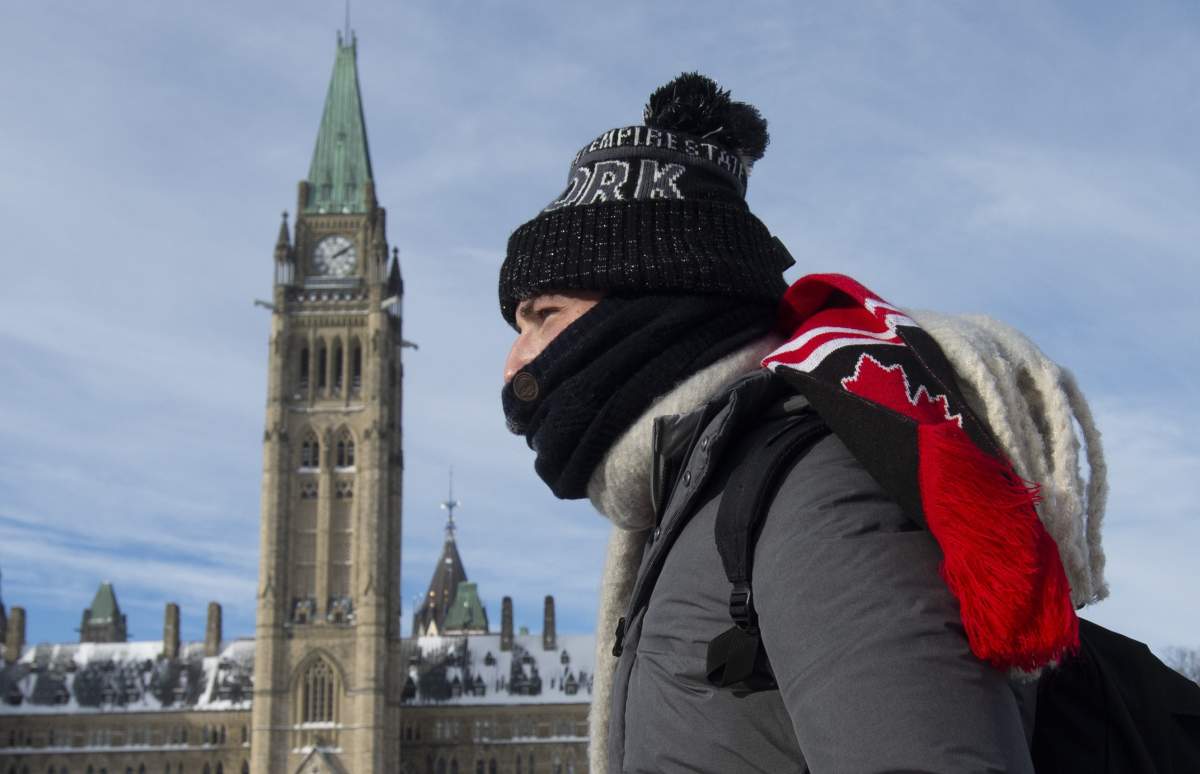As the arctic deep freeze continues to engulf parts of the country, many Canadians are bundling up and waiting for the cold to ease.

And while this time of year may be great for snowshoeing, tobogganing or snuggling up with a blanket, there are also a lot of myths out there when it comes to the cold and your health.
Here are a few of the winter myths you should steer away from.
Myth: If you’re cold you can get a cold
ABOVE: What actually helps when you have a cold or flu?
“The biggest myth is that if you are cold you are going to get a cold, but that is not really true,” Dr. Isaac Bogoch, an infectious disease physician at Toronto General Hospital, said.
He said there are viruses circulating around all the time of the year, in the winter and summer months. But in the winter, we tend to be more sedentary; we are usually indoors and closely packed together compared to other times of the year.
“This is a set up to transmit infections more efficiently,” he said.
Myth: You lose most heat through your head
You may have heard the myth that you lose 40 to 50 per cent of your body heat from your head. This misconception reportedly stemmed from a U.S. army survival manual from the 1970s, according to The Guardian.
But in 2008 a team of scientists debunked this myth. According to the study published in the British Medical Journal, heat loss is dependent on what body part is exposed at the time. So if you’re in the cold and your head is exposed, then the majority of heat will be lost through your head. But if your hands and feet are exposed, then a majority of your heat will be lost through those body parts.
WATCH: Steam rises from Lake Ontario as Polar Vortex brings frigid weather to region

Myth: Drinking alcohol keeps you warm
When some people drink alcohol, it can cause their cheeks to flush, making it appear that it warms the body up.
However, alcohol only dilates the blood vessels, it does not warm you up, Bogoch said.

Get weekly health news
Your body temperature is not changing — in fact, drinking booze could make you lose heat.
Dr. William Haynes, director of Clinical Pharmacology at the University of Iowa, told Mental Floss that when you have a drink, the volume of the blood that goes to the skin’s surface increases, which overrides a key body defence against cold temperature: constricting blood vessels, to keep your body temperature up.
- Two men charged after violent attempted kidnapping in downtown Calgary
- Calgary family living in a car calls for more resources for unhoused families
- 2 Jasper hockey players killed in crash with semi on way home to Hinton
- ‘I’ve never seen this much misery,’ says Calgary man on the front lines in Ukraine
Drinking booze can also reduce your ability to shiver (which helps you keep warm), according to a study done by the Army Research Institute of Environmental Medicine.
Myth: Vitamin C will prevent a sickness
Vitamin C is often praised as a natural cold remedy.
It is true that vitamin C is essential for immune systems, but the evidence that it helps thwart a cold is limited, according to Bogoch.
In 2007, researchers looked to see if 200 mg or more of vitamin C taken daily reduces the duration or severity of the common cold. The study found that long-term daily supplementation of vitamin C in large doses “does not appear” to prevent cold. But there appeared to be a “modest benefit” in reducing the duration of a cold with relatively high doses of vitamin C.
“There are tons of different myths and rumours with varying levels of evidence supporting them,” Bogoch said. “At the end of the day, I tell people, if this is making you feel better and not hurting you from a health standpoint and not hurting your wallet, then why not? If can provide systemic relief, why not?”
Myth: You shouldn’t exercise outside when it’s cold

ABOVE: Don’t let the cold keep you indoors this winter
If you’re hoping the frigid cold is an excuse to stop running outside, then think again.
Stephen Cheung, Canada Research Chair in Environmental Ergonomics, told Global News that running in the cold does not run the risk of freezing your lungs.
If you have a pre-existing health concern, you probably want to talk to your doctor first, but Cheung said the benefits of exercise outweigh the cold.
Myth: You don’t need sunscreen

ABOVE: What sunscreen suits your skin type?
You may not be tanning at the beach, but the sun’s UV rays can still be harmful in the winter.
On a clear day, your skin will still absorb the sun’s rays, which can cause damage. Also, snow reflects up to 80 per cent of the sun’s rays so you could be getting a double dose of radiation if you’re outside, according to the Canadian Dermatology Association.
The association recommends protecting your skin with sunscreen from 11 a.m. to 3 p.m. from late spring to early fall and during winter if you are outside.
WATCH: Canadians experiment tossing hot water into cold air creating instant vapour












Comments
Want to discuss? Please read our Commenting Policy first.